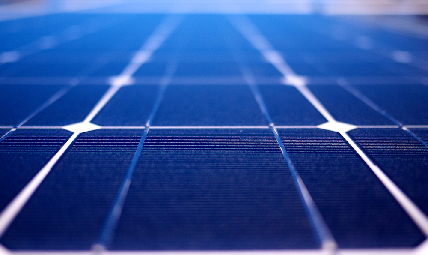University of Cambridge spin-out Eight19, which launched its Indigo pay-as-you go personal solar electricity system for off-grid communities in Kenya in September 2011, has begun trials of fully printed plastic solar modules in Africa.
Based on Eight19’s Organic Photovoltaic (OPV) technology, the Indigo solar home systems have been deployed in South Sudan in order to evaluate the performance of the new solar technology in the challenging environmental conditions that are found close to the equator.
The ability to incorporate leading edge printed solar modules in a commercial application and to feed back the results, not only to Eight19 but also to our materials suppliers, will provide invaluable data both for ourselves and for the industry, as we develop the new devices.
Simon Bransfield-Garth
Organic solar technology is so named because it is based on primarily carbon-based materials rather than traditional silicon. The ambient temperature printing processes used to make the modules results in a flexible, robust device that has a fraction of the embedded energy of conventional solar modules. In addition, in contrast to conventional solar modules, organic solar technologies do not drop in efficiency at higher operation temperatures, making them well suited to off-grid applications in Africa where the ambient temperature can exceed 40 degrees.
The modified Indigo systems contain anonymous data logging circuitry to monitor the electrical performance of the solar modules in real use. Eight19 is working closely with leading chemical and materials suppliers, using this real-world data to characterise the component parts of the new solar modules and further develop the device performance in realistic customer environments.
1.6 billion people, over one fifth of the world’s population, lack access to electricity via a grid and pay high prices for kerosene to serve basic needs such as lighting. By combining solar and mobile phone technology, Eight19 is bringing electricity directly to people’s homes thereby by passing the need for a grid connection. By offering solar power as a service, without high purchase costs, these users can now access clean electricity for less than their current spend on kerosene.
Simon Bransfield-Garth, Chief Executive Officer at Eight19 said “This is an important milestone for Eight19. The ability to incorporate leading edge printed solar modules in a commercial application and to feed back the results, not only to Eight19 but also to our materials suppliers, will provide invaluable data both for ourselves and for the industry, as we develop the new devices.”
Eight19’s organic solar modules are presently in the development phase and larger scale deployment is expected to begin in early 2013.
Photo credit: Up close with my solar panels by Michael Mazengarb via Flickr
Tags: carbon, Eight19, electricity, organic, Photovoltaic, Simon Bransfield-Garth, solar











